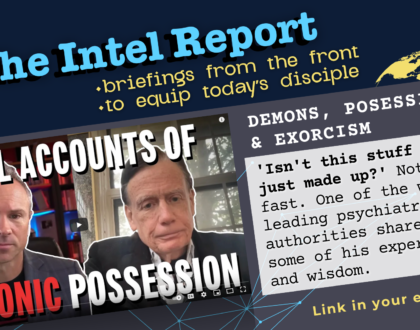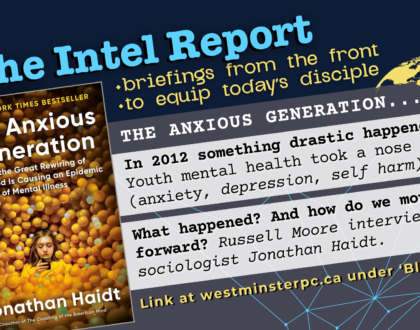Westminster’s Mission & Vision
by Westminster
On April 10th during the service I shared Westminster’s new mission and vision statements with the congregation. This blog highlights a few of the things I said.
Direction determines destination. This means that the direction you travel in has a direct bearing on where you end up. If you map out your direction, there’s a greater chance you’ll succeed in getting where you’re supposed to go.
 It’s true for how we approach school; it’s true for families; it’s true for us an individuals; and it’s true for… churches.
It’s true for how we approach school; it’s true for families; it’s true for us an individuals; and it’s true for… churches.
Consider Winchester House.
It was the home of Mr and Mrs Winchester (the same family the gun is named after). But Mr Winchester and their son passed away. Mrs Winchester was left and suffered from incredible sadness and grief.
Unfortunately she got mixed up with some unhelpful things. And some of her thinking got mixed up. As a part of that she started to expand their home, Winchester House, with epic proportions.
She engaged 16 carpenters for a span of 38 years. The house ended up with 2000 doors, many of which cost $3000 (a lot for the time). She added 160,000 windows. (That’s more than the Empire State building.) It had doors which had no purpose because they opened into brick walls. There were secret passages, and staircases that led nowhere. Some literally just went up into the ceiling and stopped.
Why did she do it? She did it to confuse death. She thought that if she had this large, confusing house, that when death came knocking, it wouldn’t be able to find her.
But of course, death came. And it found her. Death is not easily confused.
Here’s how this story relates.
Today I’m talking about the mission and vision of Westminster church. “Direction determines destination.” It’s important for the church to ask, “What are we supposed to be doing?”
Because if you don’t ask that question—if you don’t examine your direction; if you don’t inquire about the strengths God is giving you and the direction he is leading you—it’s like you’re really just building Winchester House.
Sure, the church may be busy with a bunch of projects, but a lot of them probably won’t lead anywhere—perhaps like the doors that opened into brick walls or stairs that simply ascended into the ceiling.
So it’s important for the church to ask “What are we supposed to be doing?”
This morning I’m going to share with you the mission and vision statements for Westminster church. But I’ll do more than that. I also want to help you think about your own personal mission statement. Why? Because our question (“What am I supposed to be doing?) is important for individuals as well. And our Bible passage for today, Matthew 28, impacts both of these areas in our life—our lives as individuals, and our lives as a church community.
Here’s the text:
“Then the eleven disciples went to Galilee, to the mountain where Jesus had told them to go. When they saw him, they worshiped him; but some doubted. Then Jesus came to them and said, “All authority in heaven and on earth has been given to me. Therefore go and make disciples of all nations, baptizing them in the name of the Father and of the Son and of the Holy Spirit, and teaching them to obey everything I have commanded you. And surely I am with you always, to the very end of the age.” (NIV)
This is called the Great Commission. It’s the job Jesus gives to his church after his resurrection. It’s a non-negotiable. With the full authority of God, he tells his key people to go and make disciples of all nations. A “disciple” is a follower of Jesus. It includes baptism, continual learning about Jesus’ commands, and also the promise that Jesus is with us through it all, “to the very end of the age.”
So before I outline how this Great Commission relates to our mission at Westminster, here’s some background to do with the congregation from the past 8 years. This will be new to some of you, and to some of you it will sound familiar. I think it’s important to review this because it gets us all up to speed about why we’re doing this now.
About a decade ago, Westminster went through a tough time. Some of you will remember that.
But…
- In the past 8 years Westminster has had an increasing spirit of strength and unity
- In the past 8 years Westminster has helped the community, including an H1N1 emergency centre, countless drives and projects, Vacation Bible School and March Break Camp outreaches to about 80 kids each time
Those are just a few of the highlights. From my vantage point as pastor, I see how may ways you are blessing the community.
And when you look at trends in the Sunday morning worship attendance it looks like this:
Numbers aren’t everything, but it’s important to see the trend that more and more people call Westminster their church home. Here’s how that looks more specifically:
- In the past 8 years (not including 2016) the Sunday morning worship attendance has grown 74%
- In the past 8 years (not including 2016) the Sunday school enrollment has grown from about 10 to 65
And consider this: Westminster is now numerically bigger than 82% of churches in North America. I feel the need to say that because a lot of churches can suffer from small-itis.
Here are a few conclusions:
- Westminster is evolving in a good way, both spiritually and numerically
- The congregation is increasingly inter-generational (like the community around it)
I feel God has chosen Westminster to be alive with his Holy Spirit; to be a community who puts Jesus first; and to be a place where families can worship together.
This doesn’t mean, of course, that only families are welcome. It means that as we become more inter-generational, we will be conscious about creating an environment that is family-friendly. You’d be surprised at how many churches aren’t that friendly to families.
So why are we talking about all of this now?
A few years ago we decided, as a congregation, to move to “term service” for our eldership. Presbyterian churches are overseen by elders. And under the previous system, if you were elected to serve as an elder, you would serve in that position for life or until you stepped down. But under the new system an elder serves for a term of six years. Plus, a third of the membership of elders rotates every two years. It keeps leadership fresh, strong and engaged.
In January, this new system began. But back in October, we decided that we should also seize the opportunity to update some practices and make them more efficient when Term Service kicked in. So we decided to establish “oversight areas.” This means that each elder is responsible for overseeing at least one area of the church’s life.
But, of course, when you start to tweak a few things, you develop a hunger to tweak a few more. We realized that the wise thing to do would be to establish oversight areas that best helped up achieve our mission and vision as a congregation. This prompted us to re-visit our mission and vision statements to ensure they were what we thought God wanted them to be.
Then, add in to the mix, Westminster’s growth. We are growing in a healthy way, but a bit faster than expected. So far in 2016 the average weekly attendance is 140. Sometimes it’s 120, sometimes as high as 170. We’re frequently running out of parking, some of the Sunday School rooms are getting too small, and we’re needing to think and plan ahead. So we invited a church consultant, John-Peter Smit, to talk to us. He encouraged us in this process and had some great ideas for us to think about.
So over the course of six months, the elders thought, talked, and prayed about our mission and vision. We also invited our Music Director, Jenn Harris, and our Youth Coordinator, Julie Cunha, to be a part of the process as well.
Okay, so where does that leave us? Think back to the Great Commission that Jesus gave to the church from Matthew 28. With that in mind, a mission statement is the non-negotiable reason we exist as it relates to the global church.
Up to this point, our mission statement had been “Serving Christ, Serving our Neighbours.” It was good. But as we talked and prayed, we felt that the best way to both make and be disciples was to have a mission statement that reflected the “greatest commandment” as taught to us by Jesus:
“The most important [commandment], is this: ‘Hear, O Israel: The Lord our God, the Lord is one. Love the Lord your God with all your heart and with all your soul and with all your mind and with all your strength.’ The second is this: ‘Love your neighbor as yourself.’ There is no commandment greater than these.” (Mark 12:29-31)
With this in mind, here’s what we decided our new mission statement would be:
“Loving God, Loving our Neighbours”
It is a strong and succinct statement about the reason we exist as it relates to the global church.
But by it’s very nature, a mission statement is big. That’s where a ‘vision statement’ comes in.
Think of a vision statement as Westminster’s local, specific contribution to the overarching mission of the global church. So we thought and prayed specifically about the ways we think God is using us, and about the strengths we feel God has given us. People filled in surveys and we made summaries. In the end, a few consistent themes emerged, and we formulated this vision:
“Alive with the Holy Spirit, Westminster is a Christ-Centred, Family-Friendly Church”
This statement brings together what we feel God is doing in our midst, and also the direction we feel God wants us to go. Westminster is and will be a community who puts Jesus first; who cultivates a family-friendly, inter-generational climate; and who is alive with the Holy Spirit.
When I personally think about these statements and Westminster’s direction, it’s a community I want to be a part of. It’s something I’m excited about. I hope you are too.
Not only do the statements honor what God is doing in our midst, but as we grow, they will help us focus our energies and decisions. If a new idea comes forward and doesn’t help us advance our mission and vision as a congregation, then it’s probably something we shouldn’t do. But if it does help us advance our mission and vision, then it’s probably something we should.
And wouldn’t it be great if there was something to help us internalize and memorize these statements? Wouldn’t it be wonderful if there was some kind of technology or tool that helped us keep these statements at the forefront of our minds?
 But of course, there already is. Fridge magnets! Please feel free to take some on the way out this morning. They have these two statements on them, the church’s logo, and some contact information.
But of course, there already is. Fridge magnets! Please feel free to take some on the way out this morning. They have these two statements on them, the church’s logo, and some contact information.
Direction determines destination.
I truly believe that going through this kind of exercise helps us honour what God is doing in our midst and makes us stronger and more focused as a congregation.
But will things come up, at the prompting of the Holy Spirit, that we can’t predict? Of course. But in zeroing in on these statement, on a day-to-day level, we are simply bringing greater clarity to what we should be doing.
Maybe up until this point you haven’t really thought about any of this before. And that’s fine. But if today has given you greater confidence that the leadership at Westminster is being prayerful and thoughtful about our direction, then that’s great.
But I’d like you to think about something else too.
The statement “Direction determines destination” works for you on a personal level too. Just as a church can easily become Winchester House, so can your soul.
Why do we talk about mission statements for organizations; and why do we map out a plan for things like our high school courses or even what we’ll get at the grocery store, but not for our lives? Isn’t your mission in life wildly more important than those other things?
Today I’d like you to consider doing something:
Write a 1-sentence personal mission statement for YOU.
And this also relates to the Great Commission in Matthew 28. The first thing people usually think of when they think of the Great Commission is that they are supposed to go out and make more disciples. And while I wouldn’t deny that, something else is in there first.
You need to be a disciple before you can make a disciple.
So what I think you should do is write a 1-sentence personal mission statement FOR YOU. But it should have something to do with being a disciple. And it will definitely look different based on who you are and what gifts God has given you.
- Maybe you’re a small business owner and you’re raising awareness in your industry about environmental responsibility.
- Maybe you’re retired and are intentionally making friends with people in your building no one else likes.
- Maybe you’re a stay-at-home mom and are raising your kids to be agents of social change.
Writer and professor Tony Campolo was at a dinner with his wife at the University of Pennsylvania. He describes how a woman colleague struck up a conversation with his wife who was a stay-at-home mom. Here’s how Campolo paints the scene:
“At one point she turned to my wife and asked, in a condescending fashion, “And what is it that you do, my dear?” My wife, who is one of the most articulate people I know, shot back, “I am socializing two Homo sapiens into the dominant values of the Judeo-Christian tradition in order that they might be the instruments for the transformation of the social order into the kind of eschatological utopia that God willed from the beginning of creation!” Then my wife asked politely and sweetly, “And what is it that you do?” The woman answered humbly, “I… I… teach sociology.”
And then Campolo caps the story with this insight: “We must recognize that raising children is a high and holy task.”
So no matter what you do, it’s all mission in the service of God.
And I really think you should try writing your mission statement down. On paper. Here’s why:
According to best-selling author and researcher Joseph Grenny, “Repeated studies show that simply writing down a plan increases your chance of success by more than 30%.”
So write it down. It might be tricky. It might feel strange. But you’re more likely to accomplish something you take serious enough to write down.
What’s your personal mission? How does God want to use you in this world? Why not try writing it down?
This morning I’ve taken you through Westminster’s new mission and vision statements, and related them to the Great Commission in Matthew 28. And I’ve also made the suggestion that you write your own personal mission statement as well.
 I did this because it’s important to ask, ‘What are we supposed to be doing?’ If we don’t ask that important question, when it comes to the church, and when it comes to our souls, we end up building Winchester House. We get busy and frantic and do a lot of things which don’t necessarily honour the work God is trying to do in and through us.
I did this because it’s important to ask, ‘What are we supposed to be doing?’ If we don’t ask that important question, when it comes to the church, and when it comes to our souls, we end up building Winchester House. We get busy and frantic and do a lot of things which don’t necessarily honour the work God is trying to do in and through us.
I want to end with something Wayne Gretzky said. It’s part of his creative sporty genius: “I skate to where the puck is going to be, not to where it has been.”
At Westminster we will honour our great tradition and always prioritize Jesus. And we will be able to confidently stride into the future (that place where the puck is headed) knowing that we aren’t alone, because Jesus himself promises to be with us.
“Therefore go and make disciples of all nations, baptizing them in the name of the Father and of the Son and of the Holy Spirit, and teaching them to obey everything I have commanded you. And surely I am with you always, to the very end of the age.”
Direction determines destination.
Recommended Posts

10 Unpopular things Jesus said
July 23, 2024

The Intel Report No.2 – Demons, Possession & Exorcism
July 17, 2024

